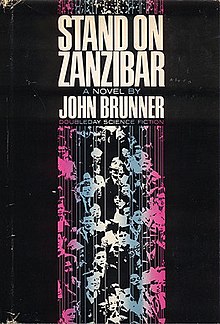 |
| Image from Wikipedia.org |
Stand on Zanzibar has the worst opening I've ever seen, a bunch of out-of-context text extracts that read like gibberish. If the novel hadn't been on my Science Fiction Classics reading list, I'd never have gotten past the first chapter, and after I did I kind of wished I hadn't. This book annoyed the hell out of me.
Brunner's "innovative structure" of chapters is split into "continuity" (the so-called plot), "tracking with closeups" (windows into the lives of minor characters/random people), "the happening world" short collections of descriptive passages, and "context" (scraps and bits of worldbuilding stuff like apartment ads, song fragments, newspaper headlines etc. etc.). It made the novel very hard to follow, especially as nothing much happened even in the plot chapters before about halfway through. I get that the structure is probably why Brunner won the Hugo award for the book, but I really, really hated it, especially the "context" and "the happening world" chapters. It just felt like Brunner had dumped his entire worldbuilding bible into the book. Thoughts like "why should I care" and "this is stupid" kept intruding on my reading experience. Apparently the structure is meant to mimic information overload, and I guess it succeeded.
It didn't help that the characters are unlikeable and the women are mainly there for sex, with the exception of the businesswoman Guinevere Steel, maybe. And nothing very interesting happened in the plot. And that annoying '60s slang: whatinole for what in hell (and different variations using "hole" for "hell"), calling women "shiggies," and poppa-momma for p.m.. So, so annoying.
Okay, so anything I liked then? Well, the worldbuilding itself is interesting at times, with Brunner's exploration of how people would react to overpopulation. Brunner's future takes place in 2010, and on some counts his predictions feel eerily accurate. The muckers, people who go nuts and start killing everybody or plant bombs for fun, hit a little too close to home in this time of school shootings and terrorists, and people using drugs and alcohol to escape their unbearable lives feels believable. I also liked the concept of Mr. and Mrs. Everywhere, a fictional couple on TV who travel the globe and attend all the most exclusive parties. The idea is that for a fee the TV fixes you and your partner's faces on the Everywheres, so you can watch yourself do all the things you can never actually afford to do.
The name of the novel refers to overpopulation. In the twentieth century there was a claim that the world's population, standing, could fit on the Isle of Wight. Brunner's prediction of the world's population in 2010, seven billion people, would need a larger island to stand on, like Zanzibar.
All in all, I can't recommend this book to anyone but the most hardcore science fiction fans. As luck would have it, there's another one of Brunner's books on my reading list. And it utilises the same "revolutionary structure." And it's six hundred pages. Oh, joy.
Science Fiction Classics read 44/193.
After your post, I enjoyed going through a list of Brunner novels, and remembering some covers and some that I've read. One of them, The World Swappers, I've enjoyed rereading very much, but the others are mostly only a read-only-once.
ReplyDeleteIn other words, Brunner wasn't smart enough to write a classic, at least, not to my American tastes. I think his classics are only classic for being original in structure.
To me a classic writer, like a classic painter, would be good enough to have a body of almost-classic work. To my taste Brunner doesn't qualify. So I think it's OK to not finish the book.
I really struggled with this one... The other Brunner book on the list is The Sheep Look Up. Do you remember that one? Any good?
ReplyDeleteMy memory is dim, but I think that when I was a boy (reading adult fiction) I started it and gave up. I hope someone else can comment here about that book.
ReplyDeleteFrom a personal coming of age point of view, coming into a civilization that was just coming into the newly created digital age, Stand On Zanzibar at the time, stood as a fairly decent description of what the information overload was going to look like. I can appreciate how strange and unwieldy it looks now. In other words, you had to be there at the time and have a sense of what was going to happen, good and bad, and ugly. Punch cards were still all the rage, magnetic tape was still the king of data, video, and audio, and a personal live data terminal inside a residence was about as common as an outhouse in the land of ceramic toilets. The Shockwave Rider illustrates what Stand On Zanzibar was saying in a much simpler, more personal, manner. The Sheep Look Up dishes up a much more paranoid, sinister, caustic version of how wrong things could go as presented in Stand On Zanzibar and The Shockwave Rider.
ReplyDelete